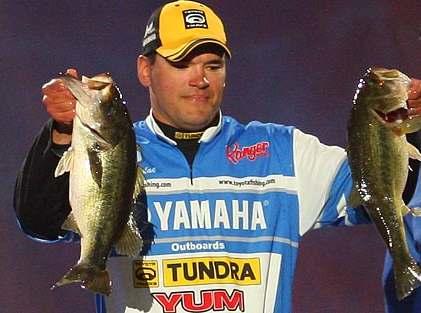In the late 1990s, Nike had a popular commercial in which attractive female fans were held in rapt attention by Mark McGuire’s batting practice heroics while Braves pitchers Tom Glavine and Greg Maddux couldn’t get even a second glance.
“Hey, we’ve got Cy Young winners over here,” they complained to no avail.
Seeing that their plight was hopeless, the two hurlers went through a crash course in hitting and when they returned to the park and started launching long distance shots of their own, the formerly oblivious babes took note.
The tagline: “Chicks dig the long ball.”
In addition to being a professional angler, Dave Wolak is also a big baseball fan. You might remember that in his inaugural season on tour he didn’t have a major sponsor, so he wore a New York Yankees hat to all of the tournaments. A few years later, he now has a passel of top-notch endemic and non-endemic sponsors, so the Yankees hat doesn’t see any stage time, but he’s still a fan of the game.
And just as many people believe that McGuire’s power was a chemically-enhanced mirage, Wolak thinks that some less experienced pro anglers need to step back and examine the “power” that they believe drives their success.
“Every time you see some up-and-coming fisherman, when they’re interviewed, they all seem to say they’re ‘power fishermen,'” he said.
“I don’t know if they think that makes them tougher or more manly, but quite honestly it aggravates me. It’s versatility and doing what’s appropriate at the given time that makes you a better, well-rounded fisherman. That’s what I look up to.”
He’s doesn’t even know what most of the posturers mean when they use the term “power fisherman.”
“You can’t even define what it is. Is it moving around fast? Is it using big lures? They just throw themselves out there without even trying to define it. You can fish a finesse bait in a power style if you want.”
With that off his chest, Wolak got to thinking about some of his own weaknesses as an angler. “In the northeast, there are so many fish, I feel like I should get bit every 10 minutes. It’s very hard for me to sit offshore all day trying to get five bites. I’m too impatient.”
He admitted that he still has a stubborn streak that sometimes prevents him from making the right moves. “For example, at Kentucky Lake I went shallow and got a ton of bites. You could have filled the back of a dump truck with all the fish I caught but I couldn’t exceed 13 pounds a day.” That led to a season’s worst 92nd place finish.
In contrast, at Lake Murray, where he made the cut to Sunday and ended up 10th overall, he managed to adjust. “I made a move that helped me to make the cut. I was catching my fish in the wind on a Money Minnow, but when the wind calmed down and it got tough, I went and caught my fish around docks.”
Even when he doesn’t succeed, he’s willing to take extra “batting practice” to get back in his groove.
“At Kentucky Lake I stayed for a few days after the tournament and I found ’em,” he said. “I got on some good offshore stuff that will help me in the future.”
While Wolak is a three time Classic qualifier, with a likely fourth berth on the way, he still sits in awe of well-known “power fishermen” like KVD, who broke out the shakey head at the right time to whack an eleven pounder at Lake Lewisville. Was that finesse fishing? Was it power fishing? It doesn’t matter.
Similarly, he spoke with admiration for Aaron Martens, who can “write the book” when it comes to finesse, but at the same time “he’s also just as apt to be using swimbaits, jigs and big worms, when appropriate, just as he did at Falcon Lake.”
In-the-know pros don’t base their opinions of their peers on who talks a good game. They don’t base it on who can flex their big bait muscles on the dock. Instead, as Wolak put it, they “admire a fisherman who can pick apart the most finite details of a fishing location, selection of lures and boat position and fish appropriately for the conditions.
Yes, chicks dig the long ball, but you can’t hit it out of the park, or even out of the infield, unless you get your mechanics down and adjust to the pitches you’re thrown. The swing that works on a 100mph fastball down the pipe might be way too fast for a quality change up or make you look silly against a nasty splitter.












